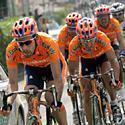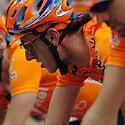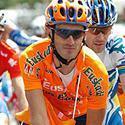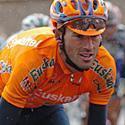
Recently on Cyclingnews.com |
91st Tour de France - July 3-25, 2004
Get set for the Orange Tide
Down, but not out, and readying themselves for the Grand Orange fiesta
Out of all the teams in this year's Tour de France, it is the Basque boys from Euskaltel-Euskadi who seemed to have copped the brunt of bad luck that has plagued the peloton in the first week of racing. But as Martin Hardie writes, with the Pyrenees looming, the riders and their people are preparing themselves for the Grand Orange fiesta - the Orange Tide.

|
This year's Tour was always going to be difficult for the gang from Euskaltel-Euskadi. Transformed from the preceding year's team that had a couple of good future bets and who were also always happy to turn on the show when the road pointed upwards, EE have had to shift their focus as both Iban Mayo and Haimar Zubeldia pass through the gateway to contender status.
All the planning as to how to stay out of trouble wasn't enough when the 2004 TdF Euskaltel project ran aground in an all-consuming sea of the peloton's first week and pre-pavé nerves. Unfortunately, the team lost en masse at least four minutes each in the act of rescuing their leadership from the carnage of Stage 3. Was this one of the inevitable or probable teething pains that Euskaltel necessarily were going to experience, as a kind of rite of passage, in their transformation year?
Remember that Euskaltel's head-honcho, Miguel Madariaga, had noted back in January that this change, the transformation might not be easy and probably would not be fully realised during this year. Speaking of the objective to win the Tour in the next three years, Madariaga noted that when you change something, it often takes a little time to get used to the new way of doing things. Rome, a Tour win, or even Euskadi, cannot be built in one day.
The rock of ages

|
Knowing that you have had a hard task hoisted upon you does not always make things easier. In Stage 3, the Orange gang encountered their worst fear - a crash just before the first section of pavé that could greatly affect their options and chances. Although they could be forgiven for showing a little disappointment, the team still have a definitive role marked out for themselves in the great scheme of things.
Even though they ran aground, their ambition is not sunk. The orange gang are tough and sturdy, even a little stoic. Maybe like a Basque tool, they are chunky and derived from rough-hewn stone.
As Mark Kurlansky noted in his book, The Basque History of the World: "Massive rough-hewn stone has always been the Basque look. 'Bai/Harri eta herri' - yes/the stone and the people - symbolise in so many ways the life of the Basques."
The hopes rising from them and blows falling on them; their landscape, their attitude and their lifestyle, all of these aspects of the way they go about things, resonate in the stone and the mountains that surround the valleys where Mayo and the team have grown up, ride and live. The Basques give the impression that they have been and will always be there, when and where they feel they can make a difference.
Of all the kufuffle about nationalism, separatism or whatever you want to label it, what seems at issue is that the Basques be able to get on in the world the way they always have, tracing a path across continents and at home, that allows them to retain their way. It is not flashy - not arrogant - but a sort of salt of the earth, life. Family, friends, language and culture - the home and the street all loom large in the Basque way of doing things.
Maybe these priorities are embodied a little in the way Iban Mayo went about life in the lead-up to the Tour. After his Dauphine win, Mayo let it be known in no uncertain terms that he didn't want to talk to the media, or perform any public appearances. He simply wanted to be left to ride with his mates in peace. That peace was not easy to find; a request to pose nude in a Spanish glossy magazine, being mobbed at the local supermarket by a crowd of screaming girls and having to be rescued and escorted out by the store's manager, even having the other Tour contenders and their entourage put out the word that he wasn't up to the task mentally. All these things swarmed around Iban's world, intruding upon his cocoon.
Without trying to say something sickeningly idealistic, such as Mayo expresses in his person all things good or typical of the Basques, his approach resonates at times of the way some go about things. They are warm and open people without being overly bombastic or demonstrative. They go about their life with a certain understated style.
For Mayo, people seem always to want more from him and he, well, he seems to just want to be left alone to ride, be with his friends and family. Mayo told Basque newspaper's Unai Larrea of DEIA just before leaving for the start in Liege that "Since I was an amateur, they have called me a 'future star', and I think that I have complied with their expectations.
"Like in the Pais Vasco or the Dauphine, but the people just don't stop, they always ask for more. Now they ask of me the Tour! The result is that now if I don't do something important in the Tour, my season has been a disaster. And it is not like that. It would be unfair. I also have hopes for the Tour. But the Tour is not the whole world. Nobody knows where are my limits in the Tour."
The unbearable lightness of being Basque

|
Unlike other contenders, who might have what we might call sporting and/or commercial pressures to perform, Euskaltel also have on top of this the weight of their very Basqueness to contend with. No matter how reserved, shy or plain bemused Mayo may seem at times, he and the other team members are more than conscious of the fact that Euskadi itself - the Basque Country - has expectations that weigh heavily on their collective shoulders.
The Basque Minister for Culture, Miren Azkarate, said before the Tour start that "for many years we have had Basque cyclists in the Tour, but never have we been able to identify with a team as we do with Euskaltel-Euskadi. The team represents the Basque people, and they have all the spirit and support of Basque society." In a similar vein, the head of the provincial government of Bizkaia, Jose Luis Bilbao, said at the team's departure ceremony: "There is only one team that is a Basque team and that is Euskaltel-Euskadi... we ask from you just one thing - that you take with dignity the name of our country on these roads. Millions of people will follow you and you go to represent all of this country, Euskadi."
This sort of support from your country and government is wonderful, and it is in part what keeps the Euskaltel-Euskadi project alive. What's more, the weight of expectation is also to a certain extent spread evenly throughout the team and not on one star. Sure people would like to see Mayo or Zubeldia on the podium, but the bursts of whipping up the race on the late uphill stretches as we are starting to see from the likes of David Etxebarria and the near misses by Iker Flores on Stage 7 and Iñigo Landaluze on Stage 9 resonate just as strongly at home.
The Grand Orange fiesta: the Orange Tide

|
At the moment, with the weekend encounter with the Pyrenees looming ever closer, there is an expectation and state of preparation in the Basque country. It is a part of what Haimar Zubeldia, described when he said that the team was an "emanation of our people". The cyclists and the institutional backers of the team are two components that help drive the orange machine. The third and by no means less crucial component is the Orange Tide - in July, the Basque people wear orange and flood the Pyrenees to greet their team as it passes by home.
This week, in every bar you encounter people, every cuadrilla discussing their heartfelt hopes that the boys can lift themselves up from the Stage 3 blow. Whilst getting excited about the showings of Flores and Landaluze, they are have been planning their transport, shopping expeditions, camping gear and viewing positions. Most important in such matters Basque is the menu for the day on the slopes - what you will enjoy in terms of sustenance as you watch the riders struggle past is one of the most important factors in Friday and Saturday's grand orange fiesta.
This talk has been going on for weeks now. And if you are a visitor (as there are a few around the place at the moment), and you have with you your Lonely Planet European phrase book, which magically commences with the Basque language, you will note in the useful small-talk section a phrase: "Euskal herrian beti jai" - the Basque country is always partying. The Basque calendar is littered with fiestas - one city, one town, one village takes its turn according to the traditional calendar to put on its party in the streets. San Fermin in Pamplona is of course the most famous, but try and imagine a thousand mini and not-so-mini San Fermin's every week during the summer, punctuated by one ever-so-special party in July when the Tour passes through the Pyrenees.
In some ways it is a human spectacle that really doesn't seem to have any precedents or comparison. And it is a spectacle tied intimately to what Euskaltel-Euskadi symbolise and to the very nature of Basque life. For the past three years, it has seemed that the whole population of the Basque Country has turned orange and moved en masse to the TdF and lived what David Etxebarria described as a "grand fiesta of Basque cycling".
As you sit back and watch the Tour and prepare to bare witness that tide of orange, as the climbers and the gruppetto pass through that sea of red, green and white flags along with a whole host of other more overtly political banners, remember that the orange signifies much more than just another pro cycling team. Orange has become a fourth national colour, a metaphor for all things that are embodied in the spirit of being Basque.
Preparing for another invasion

|
On the Tour's first rest day, Iban Mayo, physically and mentally battle-scarred from a hard first week, told DEIA's Unai Larrea that he was hoping that his girlfriend Goretti's arrival would bring with it the good fortune it did last year when she came the night before his win on Alpe d'Huez.
"Physically I feel better than ever, including better than last year. I am recovering my strength very well from one day to the next: my motor is intact and ready to fire at the top. People said to me last Thursday that I had been tempted to abandon... but I told them that was ridiculous. It would have been cowardly," he said.
"Now we have the mountains on the horizon. It is my terrain. Everyone is asking me if I am going to attack. If I can, of course I will have to do it, but first I have to know where I am exactly, and this will be when we get to the first serious climb of the race. I know that even with the weight of the time I have lost, my rivals still consider me a a danger in the general. Because of this, they will not let me go from far out, but that is the best way to reduce differences. But still, I won't have to race in desperation... I have to be cold and aggressive at the same time - I have to go with my shotgun loaded.
"If I could choose, I would choose to win at La Mongie. For me, for the team and for the thousands of Basque fans that accompany us so closely and who are right now preparing themselves for another invasion. It would be incredible. But it will be complicated, because many people want to win this stage."
To the team and to their fans Mayo is right - it would be incredible.
